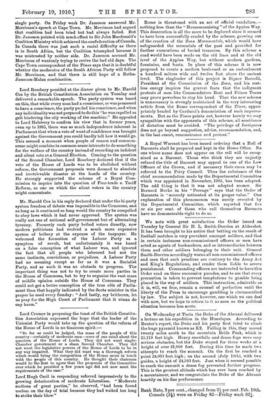Mr. Harold Cox in his reply declared that under the
hi-party system freedom of debate was impossible in the Commons, and as long as it continued so long would the country be compelled to obey laws which it had never approved. The system was really not one of national self-government but of alternating tyranny. Formerly each party bribed voters directly, now modern politicians had evolved a much more expensive system of bribery at the expense of the taxpayer. He welcomed the formation of the Labour Party as a symptom of revolt, but unfortunately it was based on a false conception of what Labour was, and ignored the fact that all people who laboured had not the same instincts, convictions, or prejudices. A Labour Party had no meaning except so far as it was a Socialist Party, and as such it was an obstacle to progress. The important thing was not to try to create more parties in the House of Commons, but to try to organise the vast mass of middle opinion outside the House of Commons. They could not get a better conception of the true role of Parlia- ment than that happily indicated by the Scots minister in the prayer he used every Sunday: "And lastly, my britheren, let us pray for the High Court of Parliament that it winna do ony harm."








































 Previous page
Previous page